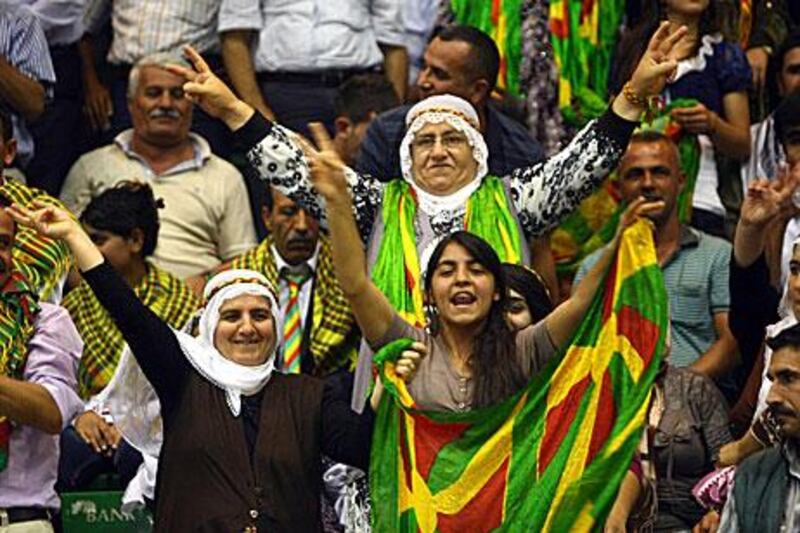ISTANBUL // As Turkey's politicians try to reach consensus on a new constitution, demands for more rights and greater self-rule for minorities and ethnic groups are challenging long-held principles of national unity under a centralised government.
With officials telling the country to expect a new constitution before the end of the year, calls for more rights are coming from the country's huge Kurdish population and other groups.
"I want to see more freedom of expression, and I want the right to teach children their own mother tongue," Ozcan Sapan, a Turkish publisher and member of the Laz community, an ethnic group from Turkey's north-eastern Black Sea coast, said yesterday. The right to teach, learn and freely use one's own language should be guaranteed by the new constitution, he said.
A recent poll put the number of Laz in Turkey at 1.7 million.
Representatives of the Kurds, Turkey's largest ethnic minority comprising 12 million of the country's 74 million people, have called for more language and political rights. Last week, the Party for Peace and Democracy (BDP), Turkey's main Kurdish party, said it wanted the new constitution to safeguard language rights for Kurds and to end the ban on using the words "Kurdish" and "Kurdistan" in the name of parties or associations.
The BDP wants Ankara to recognise "a political status that includes the right of the Kurdish region to govern itself".
Demands for more freedom for ethnic groups and for autonomy for Turkey's regions are controversial in a country that has long seen national unity as its most sacred value and that has been fighting against rebels demanding Kurdish self-rule for almost 30 years.
A committee of 13 politicians from all four parties represented in parliament has been working on the new constitution since October. The committee includes members of parliament from the ruling Justice and Development Party (AKP) of Recep Tayyip Erdogan, the prime minister, the secularist Republican People's Party (CHP), the MHP as well as the BDP.
But Sahin Alpay, a political scientist and columnist for the newspaper Zaman, told The National that the violence in the Kurdish region, where the Kurdistan Workers' Party (PKK), has been fighting the Turkish military since 1984, made constitutional reform very difficult. "If violence came to an end, it is possible that [Kurdish] demands would be met," he said.
Mr Alpay also said he saw a solid majority supporting a transformation to a "citizen state" with a pluralistic democracy, secularism and a non-ethnic definition of citizenship. "This is really what we need," he said.
The current constitution defines every Turkish citizen as a "Turk", but groups such as the Kurds say this definition negates their cultural identities.
Mr Alpay argued that a "citizen state" would allow Kurdish to become an official language in the Kurdish region and would pave the way for a Turkish-Kurdish bilingual education in regional state schools. The professor added he favoured devolution of powers from the centre to 20 or 25 administrative regions.
Turkey's present constitution, written under military rule in 1982, frowns upon regional autonomy and bans state education in non-Turkish languages of the country's many different ethnic groups. "The Turkish state, with its territory and nation, is an indivisible entity. Its language is Turkish," declares Article 3.
One of the questions that talks about the new constitution will have to answer is whether Turkey should scrap provisions such as Article 3 and replace them with more liberal formulas that give Kurds and others more rights.
A few weeks ago, a deputy prime minister drew angry comments from nationalists when he suggested that demands for more rights for Kurds or other groups would be addressed in the new constitution.
"Whether someone says he has a Kurdish identity, an Arab identity, a Bosnian identity, or whatever, everyone will be able to express his identity in peace, whatever it is," Bulent Arinc, a deputy prime minister, told parliament last month. "We will respect this identity. We will grant all cultural rights and all constitutional rights to that identity."
Devlet Bahceli, the leader of the right-wing Nationalist Action Party (MHP), called Mr Arinc's speech a "provocation" and a sign that the government was collaborating with Kurdish nationalists and the PKK.
Cemil Cicek, the speaker of parliament who chairs the constitutional committee, has said he wants the new constitution to be written by the end of the year. The committee has been working through thousands of proposals. Thirty-seven universities, 14 business groups and trade unions, 35 associations, 29 foundations, 14 political parties and close to 6,000 individuals have handed in their suggestions, according to news reports.






